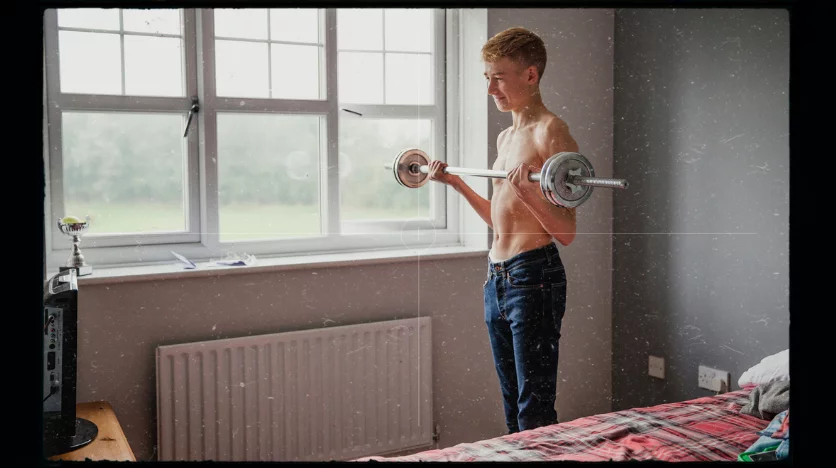There have been many efforts to raise awareness for body image issues and eating disorders, especially among girls, who try to strive towards an unattainable or unrealistic body and torture themselves physically (and mentally) in the process.
These health conditions, especially eating disorders like anorexia, bulimia, and binge eating disorder, are deathly serious. But they aren’t solely unique to girls.
Teen boys can and do worry about their body image, often to a similar level of detriment. Male anorexia does exist, may be underdiagnosed, and does carry a significant death toll – but many teens with male body image issues are worried about being too small rather than not thin enough.
As with other body image issues, the core of the matter isn’t your teen’s actual body. While we should take care of ourselves, many physical elements are relatively set in stone when we’re born – from potential height to facial features and bone structure. Even the level of muscle we can put on is dependent on our genes, and not everyone can hit a genetic lottery.
Teen male body image issues are born from an intense self-loathing and a feeling that – no matter how one looks – it isn’t good enough. Immediate action across society is needed to safeguard the health of young people, including actions within families, schools, and regulations on advertising that promote unrealistic body standards.
While some boys do struggle with an obsession with thinness, our focus today will be on a different kind of body dysmorphic disorder, commonly called muscle dysmorphia.
Understanding Teen Male Body Image Issues
Teens with muscle dysmorphia generally perceive themselves as less muscular than they are or feel that they need to be much more muscular, leading to body dissatisfaction.
This can lead to unhealthy eating habits, exercise regimens, and even anabolic steroid abuse. It’s important to separate a healthy and positive relationship with sports and progressive physical goals to a disordered perspective, where self-destructive habits are a symptom of underlying self-loathing and depression.
Teens with body image issues aren’t training to reach a certain goal, nor are they training solely because they enjoy it. Their eating and exercise habits are an unhealthy coping mechanism and consequence of a mental health issue that stems from a disordered self-image.
Even professional bodybuilders, who win awards for their dedication to size and symmetry, have confessed to looking in the mirror and seeing nothing but flaws. Perceptions of self can affect not only emotional well-being but also social interactions, educational pursuits, and long-term health outcomes.
Body Image Perceptions in Young Adults
Young adults are particularly vulnerable to body image concerns due to the significant physical, emotional, and social changes they experience during this stage of life.
Research suggests that body image perceptions in young adults are influenced by a combination of factors, including societal expectations, media representation, and family dynamics.
Positive Body Image is Essential
A positive body image is essential for young adults, as it can impact their mental health, self-esteem, and overall well-being. Conversely, poor body image perceptions can lead to disordered eating behaviors, eating disorders, and other mental health concerns.
Young adults who engage in regular physical activity and practice healthy eating habits are more likely to develop a positive body image.
Social media can have a significant impact on body image perceptions in young adults, with unrealistic beauty standards and filtered images contributing to body dissatisfaction.
Family members, particularly parents, can play a crucial role in shaping young adults’ body image perceptions through their own body image concerns and weight-related behaviors.
By fostering a supportive and positive environment, families can help young adults develop a healthier relationship with their own bodies.
Societal Expectations and Body Image
Societal expectations around body shape, size, and weight can have a profound impact on individuals’ body image concerns.
The media perpetuates unrealistic beauty standards, promoting a narrow and unattainable definition of beauty that can lead to body dissatisfaction and negative body image. The fashion and beauty industries contribute to these societal expectations, often promoting unhealthy and unattainable beauty standards.
The impact of societal expectations on body image can be particularly damaging for individuals who do not conform to traditional beauty standards, such as those with disabilities or from diverse cultural backgrounds. Societal expectations around body image can also contribute to eating disorders, with individuals feeling pressure to achieve an unrealistic body ideal, illustrating the negative outcomes this pursuit can end with.
Promoting diversity and inclusivity in media representation can help to challenge societal expectations around body image and promote a more positive and accepting body image culture.
Educating individuals about the impact of societal expectations on body image can also help to promote critical thinking and media literacy, reducing the negative impact of societal expectations on body image concerns.
How Do Teen Male Body Image Issues Develop?
As with other mental health issues, there are several factors at play.
Teens face challenges regarding body image, emphasizing the vulnerability of adolescents to societal pressures and unrealistic beauty standards perpetuated by social media. One might appear more prevalent than others – such as being bullied for one’s looks, pressure from coaches or peers to perform and get bigger, or an obsession with online fitness content.
But it’s usually multiple factors coming together that lead to the development of body image issues. These include:
- Genetics
- Home environment and stress
- Pressure to perform
- Peer influence
- Media
- Depression and anxiety
Family Members’ Influence on Body Image
Family members, particularly parents, can have a significant impact on individuals’ body image concerns, with their own body image concerns and weight-related behaviors influencing their children’s body image perceptions. Family weight talk, or conversations about weight and body shape, can contribute to body dissatisfaction and negative body image in children and adolescents.
Parents who engage in healthy eating habits and regular physical activity can promote a positive body image in their children. Conversely, family members who criticize or comment on an individual’s weight or body shape can contribute to body image concerns and negative body image.
Family dynamics, such as sibling relationships and parental relationships, can also impact body image concerns, with individuals who experience positive and supportive relationships with family members more likely to develop a positive body image.
Educating family members about the impact of their behaviors and comments on body image can help to promote a more positive and supportive body image environment. Encouraging open and honest communication about body image concerns within families can help to promote a more positive and accepting body image culture.
Advertisements and Social Media
It’s become something of a staple to blame social media for our societal problems, especially mental health. Still, the evidence for social media’s impact on self-esteem and male body image is quite strong. The very nature of social media as a reflection of society’s pop interests and a medium that plays an active daily role in shaping a teen’s worldview means that teens are strongly influenced by what they see online.
When it comes to masculinity and male attractiveness, teens are regularly bombarded with images of incredibly muscular athletes, actors, and influencers, not all of which attained their bodies through “natural” or healthy means. It’s no secret that the average Hollywood star has been steadily trending towards a more muscular body in the last few decades, and male influencers – especially in the fitness industry – are all chiseled out of the same marble.
The average teen or adult male can pack on some muscle in a year of training and make about half of the same gains in their second year, diminishing returns over time. Some are luckier than others, and some take longer to develop. Most fitness transformations – especially in industries where these are meant to make a sale, from movie tickets to diet programs – go “above and beyond” regular exercise and healthy eating, to the point that they may often use some supplemental help.
We aren’t talking about protein shakes, either. For impressionable teens, these unrealistic transformations and training goals can be actively harmful – especially when they realize they aren’t making anywhere near the same amount of progress. These influences aren’t black or white. There is certainly an argument to be made for the positive impact of a social media feed revolving around health and wellness.
Teens with an interest in physical fitness and sports are just pursuing their hobby, as any other teen might. But as with anything else, the dose makes the poison, and to an insecure teen, overexposure to the “ideal male body” can greatly warp their sense of what is normal and healthy.
Educating individuals about the impact of societal expectations on body image can help to promote critical thinking and media literacy, reducing the negative impact of societal expectations on body image concerns.
Body Image Issues, Eating Disorder Symptoms, and Mental Health
Low self-esteem and body image issues correlate heavily with existing mental health issues. It is important to recognize when teens may need professional help regarding body image issues, highlighting the role of parents in identifying concerning behaviors and encouraging intervention.
This includes conditions like binge eating disorder, which is characterized by episodes of excessive eating without subsequent purging. This also means that boys struggling with anxiety, depression, or other mental health conditions are more likely to feel inadequate about how they look, regardless of what pressure they’re exposed to (or lack thereof).
Sometimes, it’s enough to look around and realize that you look different from your peers to begin feeling down about that difference, especially if you perceive it to be negative.
Conversely, a burgeoning body image problem can lead to other mental health issues later down the road. What might begin as a hobby, but has since turned into an obsession, can fuel feelings of depression and anxiety, especially concerning one’s appearance and physical fitness. You can look conventionally attractive, perform above average in sports, and be stronger and fitter than your other classmates, but still be deeply unhappy with your body. Maybe you think your quads are too small.
Maybe you feel weak because you only bench more than your peers but haven’t claimed the state record. Meanwhile, a teen with a healthy body image might not be the strongest, tallest, or fittest in their group, but don’t feel worried about it either.
When struggling with body image issues, how you currently look never matters – your goals will always shift towards the unattainable and will become a source of constant misery rather than a form of motivation.
The problem doesn’t start with your body. It’s always a matter of mental health.
How Are Teen Body Image Issues Treated with Professional Help?
If your teen is showing signs of body dysmorphia, such as being deeply unhappy about how they look, being overly critical of their body at all times, and going to unhealthy lengths to try and change themselves, it’s a good idea to contact a professional first. This is also true for other eating disorders like binge eating disorder, which requires professional intervention.
And remember, it takes time to address and confront disordered thinking, especially when it’s rooted in strong self-loathing.
Teen male body issues require learning to accept oneself, tackling low mood and anxious thoughts, and developing a healthier way to cope with negative thinking through therapy and medication.
For more information, reach out to us today. At Visions Treatment Center, we have the tools and professional guidance you need to overcome teen male body image issues and other underlying mental health problems.






